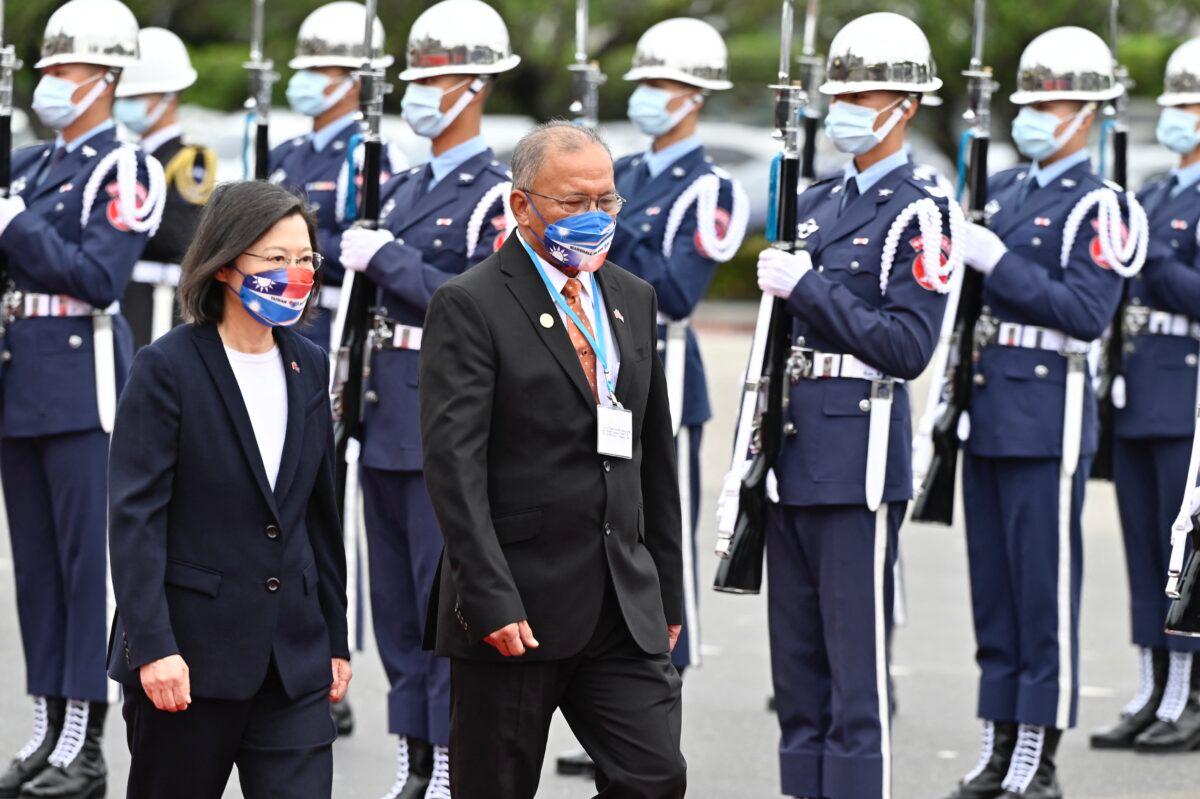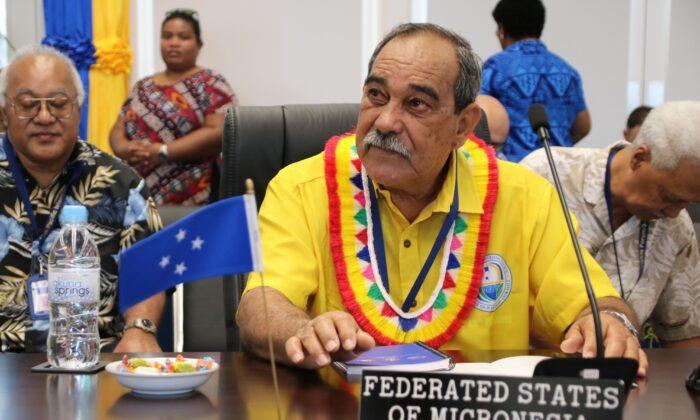Amidst this increasing power rivalry with China, the United States should elevate engagement with these nations, the report stated.
“The United States has historically assigned only limited diplomatic resources to the FAS and even less to other Pacific Island nations. By contrast, China has consular staff for and frequent working and senior-level engagement with every Pacific Island nation with which it has diplomatic relations,” stated the report, released on Sept. 20.
China perceives Washington’s “limited” engagement as a strategic void in the Pacific Island region and has been open about its intentions to fill it, USIP said.
The Pacific Island region extends from Asian littoral waters in the west, Guam in the north and Hawaii in the northeast, and Australia and New Zealand in the south and southwest respectively, and includes the 15 island nations: Commonwealth of the Northern Mariana Islands, the Federated States of Micronesia, Fiji, French Polynesia, Kiribati, the Marshall Islands, Nauru, New Caledonia, New Zealand, Palau, Solomon Islands, Tonga, Tuvalu, Vanuatu, and Wallis and Futuna.
While Kiribati, Samoa, Solomon Islands, Tuvalu, and Vanuatu are classified as least-developed countries, New Zealand is a developed country and the remaining countries and areas are identified in as developing countries.
The United States is bound with the Federated States of Micronesia, the Republic of the Marshall Islands, and the Republic of Palau through an international agreement called the Compact of Free Association; these countries are called the Freely Associated States (FAS). The agreement allows these states access to U.S. domestic economic programs and allows the United States to operate defense bases in these nations. The citizens of FAS are also allowed to serve in the American armed forces.
However current U.S. diplomatic engagement with FAS is “sprawling and decentralized” and this can weaken the bilateral relations and act against the interest of U.S. national security, according to the report.
“Even a modest increase in diplomatic resources is likely to meet with an enthusiastic reception from regional officials,” stated the report, which was the result of a project that convened a group of 16 experts who interviewed officials and experts from the FAS and from other countries around the region.
As the competition between the United States and the Chinese regime gains pace in the Pacific region, the FAS presents a unique opportunity for the United States whose military is expanding its force posture, the report stated.

“U.S. defense rights in the FAS present unique opportunities for new facilities and dual-use ports and airfields development. Strong U.S.-FAS connections mean that a deterioration in FAS economic or security conditions would have spillover effects into U.S. states and territories,” it stated.
In a diplomatic tug of war, the Chinese communist regime was successful in flipping some Pacific Island nations to its side. After Solomon Islands and Kiribati switched their diplomatic affiliation from Taipei to Beijing, Taiwan was left with diplomatic recognition from only four Pacific Island nations.
“Finally, two of the three FAS, Palau and the Marshall Islands, maintain diplomatic ties with Taipei, fortifying Taiwan’s international space at a time when it is under relentless pressure from Beijing,” the report stated.
The U.S. State Department by year’s end will renew strategic partnership agreements with the three FAS: Pacific Island nations of Palau, Micronesia, and the Marshall Islands. This has come through after six months of intensive negotiations, according to Special Presidential Envoy Ambassador Joseph Yun. The USIP report said this should be further leveraged.
“Washington has an important opportunity in the ongoing Compact negotiations to strengthen its bilateral ties with the FAS and demonstrate a commitment to addressing their core interests to further US national interests and peace and security across the region,” stated the report.

Recommendations
According to the report, the U.S. administration should work with the FAS nations to push back against increasing Chinese influence in the Pacific Island region, and oppose any displacement of existing diplomatic and security relationships that push rivalry with the United States.“The goal should be framed as preventing a level of Chinese influence that would destabilize regional institutions and exacerbate divisions among Pacific Island states,” it said.
To gain their confidence, the United States should set up a recurring strategic dialogue with the FAS and other Pacific island nations at a level of seniority and clearly communicate to them that they hold importance to Washington. “To that end, a US-FAS dialogue may be most appropriately staffed at the assistant secretary level (or equivalent) and be conducted virtually, on occasion, if needed,” the report stated.
The National Security Council’s new national strategy for the Pacific Islands should identify U.S. interests in the Pacific Island nations.
The White House, according to USIP, should “develop a plan to use diplomatic, defense, and economic tools to secure those interests in conjunction with regional partners and frameworks,” and should also commission an intelligence report on China’s interests in the Pacific Islands region to support this effort.
“Additional resources should be allocated to ensure close monitoring of China’s increasing activity in the FAS, with a view to ensuring that US and FAS policymakers are apprised of opportunities to invoke rights of strategic denial,” stated the report.
The FAS should also be made a central part of the United States’ overall military disposition in the Indo-Pacific, according to the report.
“The Federated States of Micronesia recently agreed to develop new military facilities on its territory. Additionally, Palau has formally requested that the United States establish airstrips, ports, and bases on its islands, a request Washington should consider seriously to the extent that it aligns with defense needs,” the USIP said in the report.
Other recommendations of the report include building a counter-narrative to China’s posturing on climate and economic development, and playing an active role in promoting various exchanges involving Taiwan, the Marshall Islands, Palau, and other Pacific Island nations, including Kiribati and Nauru.





